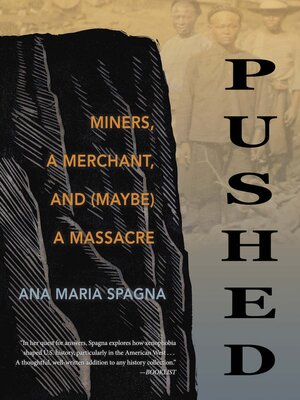
Sign up to save your library
With an OverDrive account, you can save your favorite libraries for at-a-glance information about availability. Find out more about OverDrive accounts.
Find this title in Libby, the library reading app by OverDrive.



Search for a digital library with this title
Title found at these libraries:
| Library Name | Distance |
|---|---|
| Loading... |
A personal investigative journey into the so-called Chelan Falls Massacre of 1875.
Amid the current alarming rise in xenophobia, Ana Maria Spagna stumbled upon a story: one day in 1875, according to lore, on a high bluff over the Columbia River, a group of local Indigenous people murdered a large number of Chinese miners—perhaps as many as three hundred—and pushed their bodies over a cliff into the river. The little-known incident was dubbed the Chelan Falls Massacre. Despite having lived in the area for more than thirty years, Spagna had never before heard of this event. She set out to discover exactly what happened and why.
Consulting historians, archaeologists, Indigenous elders, and even a grave dowser, Spagna uncovers three possible versions of the event: Native people as perpetrators. White people as perpetrators. It didn't happen at all. Pushed: Miners, a Merchant, and (Maybe) a Massacre replaces convenient narratives of the American West with nuance and complexity, revealing the danger in forgetting or remembering atrocities when history is murky and asking what allegiance to a place requires.
Amid the current alarming rise in xenophobia, Ana Maria Spagna stumbled upon a story: one day in 1875, according to lore, on a high bluff over the Columbia River, a group of local Indigenous people murdered a large number of Chinese miners—perhaps as many as three hundred—and pushed their bodies over a cliff into the river. The little-known incident was dubbed the Chelan Falls Massacre. Despite having lived in the area for more than thirty years, Spagna had never before heard of this event. She set out to discover exactly what happened and why.
Consulting historians, archaeologists, Indigenous elders, and even a grave dowser, Spagna uncovers three possible versions of the event: Native people as perpetrators. White people as perpetrators. It didn't happen at all. Pushed: Miners, a Merchant, and (Maybe) a Massacre replaces convenient narratives of the American West with nuance and complexity, revealing the danger in forgetting or remembering atrocities when history is murky and asking what allegiance to a place requires.







